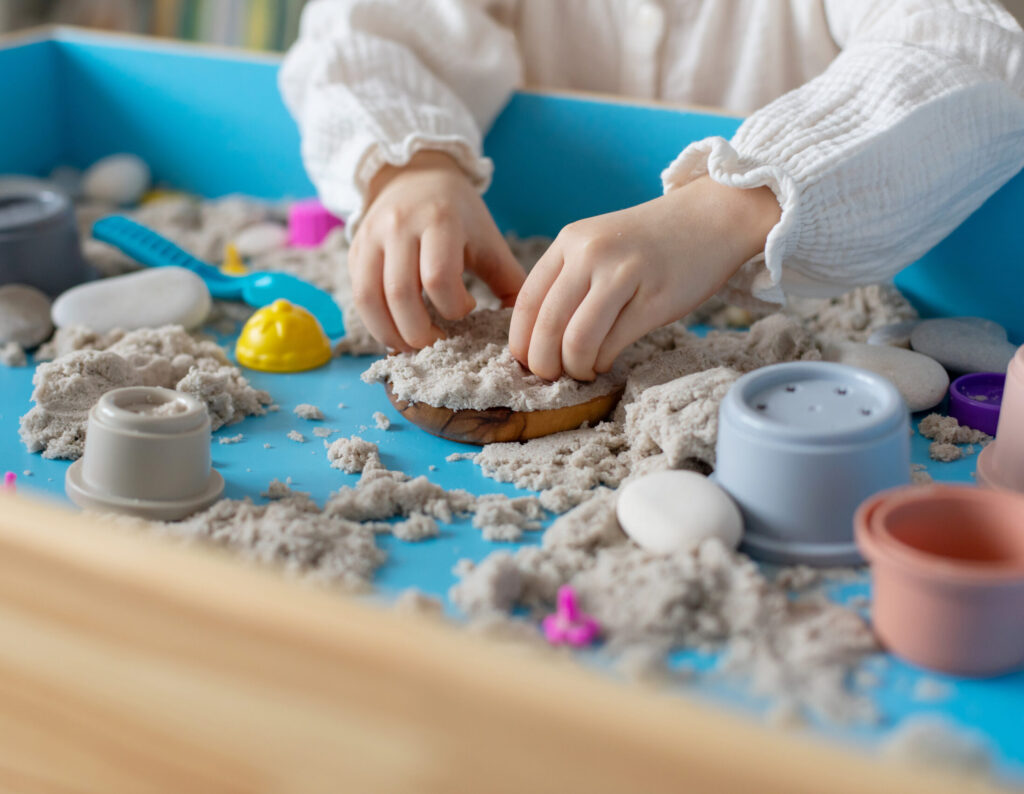Pediatric Occupational Therapy for Sensory Processing Difficulties
in Charlotte & Huntersville, NC
Supporting Your Child’s Comfort and Confidence
Does your child get easily overwhelmed by loud noises, bright lights, or certain clothing textures? Or do they seem to constantly be on the move, touching things and full of energy? These may be signs of sensory processing difficulties that can affect how your child experiences the world around them.
At Little Wonders Pediatric Therapy, our occupational therapists help children learn to manage and make sense of sensory input so they can feel more comfortable, confident, and ready to engage in everyday life.
Let’s take a closer look at what sensory processing difficulties are, what signs to watch for, and how occupational therapy can make a difference for your child.
What Are Sensory Processing Difficulties?
Sensory processing difficulties are when the brain has trouble receiving and responding to information it receives from the senses:
- Touch
- Hearing
- Sight
- Taste
- Smell
- Body awareness
For some children, this can mean they feel overstimulated by things others barely notice. For others, it may mean they seek out more movement or pressure to feel balanced.
These sensory challenges can affect your child’s ability to focus, play, learn, and interact with others. The good news is that with the right support, children can learn strategies to regulate their responses to sensory input and feel more in control of their world.

Common Signs of Sensory Processing Difficulties
Everyone has sensory preferences, but when these sensitivities start to interfere with daily life, it may be time to seek an evaluation. Some common signs of sensory processing difficulties include:
- Becoming upset by loud noises, bright lights, or crowded spaces
- Refusing certain clothing fabrics or food textures
- Constantly moving, spinning, or crashing into things
- Avoiding activities like finger painting, brushing teeth, or haircuts
- Trouble focusing or following directions in busy environments
- Difficulty calming down after excitement or frustration
- Seeking hugs, pressure, or movement to feel settled
- Appearing clumsy or unaware of their body position in space
What Causes Sensory Processing Difficulties?
Sensory processing difficulties can appear on their own or alongside other developmental conditions such as autism spectrum disorder. However, many children experience sensory challenges without a formal diagnosis.
While the exact cause isn’t always known, we do know this: children with sensory processing difficulties aren’t “too sensitive” or “misbehaving.” Their brains are simply processing sensory information differently. And, with the right tools and guidance, they can learn to manage their response to their environment and feel calmer and more confident in everyday life.
How Occupational Therapy Can Help with Sensory Processing
At Little Wonders Pediatric Therapy, our occupational therapists create playful, hands-on sessions to help your child explore and respond to sensory input in a safe and supportive environment. We use a combination of movement, textures, balance activities, and calming strategies to help children:
- Improve tolerance to different textures, sounds, and environments
- Develop stronger self-regulation and coping skills
- Strengthen coordination, balance, and body awareness
- Increase focus and attention for learning and play
- Build confidence and independence in daily activities
- Enjoy new experiences with greater comfort and curiosity
Our goal is to help your child feel capable and regulated (or relaxed and able to handle sensory input with confidence). We’ll give your family the tools to make everyday life a little easier and a lot more joyful.
Schedule an Evaluation Today
If your child struggles with sensory sensitivities or seems easily overwhelmed, our team at Little Wonders Pediatric Therapy is here to help. Call us today at (704) 752-1616 to schedule an evaluation at our Charlotte or Huntersville location. Together, we’ll help your child build their confidence and make wonders happen.